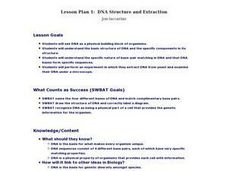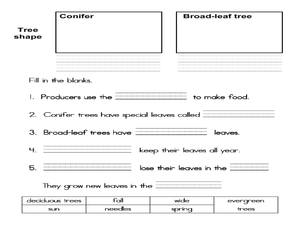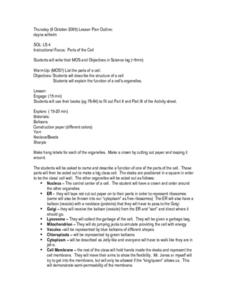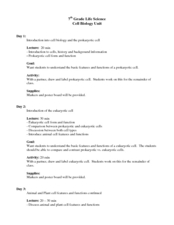Curated OER
Unit: Processing and Manufacturing: Examination Three
StudentsMatch the vocabulary terms in column A with the definitions in column B. Write the letter of the definition in column B in the space next to the terms in column A. Afterwhcich, students Write short answers or fill in the blank to...
Curated OER
Investigating Mitosis in Allium Root Tip Squash
Preparing the root tip samples is the most challenging part of the mitosis-viewing lab found here, but the directions help ensure you have everything you need. There is no worksheet included; however, there is a sample data table....
Curated OER
DNA Structure and Extraction
Students see DNA as a physical building block of organisms and comprehend the basic structure of DNA and the specific components in its structure. They can explain the specific nature of base-pair matching in DNA and that DNA bases form...
Biology Corner
Cell Theory Rap
All that this will link you to is a rap about cell theory and organelles. Use it as an example for a creative assignment in your biology class. Divide the class into groups and assign them a topic for which they write and perform a skit,...
Curated OER
Mini-Ponds
In this mini pond worksheet, students create a mini-pond ecosystem with soil, water, and plant life. Students let their ecosystem sit for a day and they observe a sample the next day. Students identify all the pond water microorganisms...
Curated OER
Producers -- Focus on Trees
Students examine the needs of trees and plants. In this forest ecosystem lesson plan students use seedlings to investigate the basic necessities of plants. They discuss the consequences of these basic needs not being met.
Curated OER
Parts of the Cell
Young scholars examine plant and animal cells to observe the organelles present in the cell, to match the function of each to the organelle on a cell model and to build a model of the plant or animal cell.
Curated OER
To Have Or Not To Have Oxygen (Part I - Fermentation)
Students explore the fermentation process. In this biology lesson plan, students describe the process of glycolysis and infer the reactants and products of fermentation.
Lincoln Public Schools
Cell Exploration Activities
Engage young biologists in exploring the mysteries of life with this collection of hands-on activities. Enlisting the help of numerous digital resources, students get an up-close look at the structure of plant and animal...
Columbus City Schools
To Measure its Mass or Volume?
Atoms, elements, and molecules, oh my! Teaching the fundamentals of chemistry to curious sixth graders has never been easier to accomplish. Here is a resource that pulls together everything needed to get them off to a good start,...
NOAA
Mud is Mud...or is it?
We know that the type of soil varies by location, but does the seafloor sediment also vary, or is it all the same? Scholars compare photos of the seafloor from two different locations: the Savannah Scarp and the Charleston Bump. Through...
Curated OER
What Kind of Insect is That?
Fifth graders characterize insects and classify insects according to the Linnaean system. They use hand lenses or microscopes to examine insect body parts.
Curated OER
The Effects of Osmotic Balance and Imbalance In Living Cells
Students investigate osmotic balance in living cells. In this osmotic balance lesson plan, students use elodea leaves to study the effects of salt solutions on the cell. They compare the changes in an elodea leaf with salt water on it to...
Curated OER
Salt: Up Close and Personal
Students predict, observe, and explain the details of salt as they view it under a variety of magnifications. They observe salt with the naked eye, and then under a hand lens, microscope, and the electron microscope.
Curated OER
Cells All Around
Students measure the size of an epithelial cell and to estimate the number of epithelial cells in a given area of the body. After watching a video on cells, student groups perform an experiment using a microscope to view some of their...
Curated OER
PARAMECIUM RESPONSES TO STIMIULI
Learners design the test they use to examine, how the paramecium move, feed, and react to different types of stimuli such as a drop of vinegar. They conduct a lab experiment using a microscope.
Curated OER
Comparing Plant and Animal Cells
In this comparing plant and animal cell worksheet, students use a microscope to observe cheek cells and onion cells. They compare their observations and answer 3 questions about their discoveries.
Curated OER
Pond Life
Students explore pond ecosystems. In this living environment instructional activity, students observe the local pond and identify the living things they find by drawing pictures. Students observe organisms that were found in the pond by...
Curated OER
Animal Organs and the Study of Reproduction, Embryology and Cancer
Students examine organs from dogs and cats to study reproduction, embryology, and the identification of cancer. They record their observations at both the gross and microscopic levels. They present their information to the class.
Curated OER
Secrets of Making Money
Students examine the properties of different materials used to make paper money. They design their own bill and share it with the class. They also watch a video clip and read an article about making money and how it affects the economy.
Curated OER
Plasmolysis in Elodea Plant Cells
Students microscopically observe various subcellular components. They determine the effects of different salt solutions on Elodea plant cells. They detect the presence of chloroplasts, cell walls, and cell membranes of Elodea.
Curated OER
Cell (Biology)
Students conduct a series of activities to explore the nature of cells. In this biology lesson, students observe plant and animal cells under the microscope and compare them. They differentiate osmosis and diffusion.
Curated OER
Brine Shrimp Life Cycle
Third graders examine brine shrimp through "A Sea Monkey's Life" story. They study the living environments and life cycle of brine shrimp. They look at brine shrimp and cysts through a microscope, identifying new vocabulary that was...
Curated OER
The Science and Technology of Food
Students examine the guidelines the United States Department of Agriculture places on food. In groups, they create a list of the foods they consume and discuss the political and environmental implications of purchasing the food. They...

























